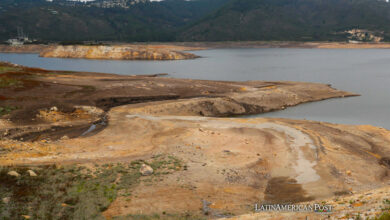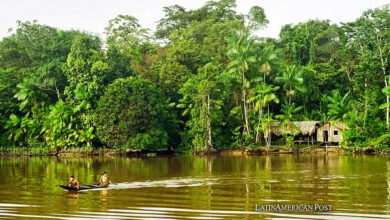The celebration of World Wetlands Day and the Escazú Agreement
Stay informed on the most important environmental news from around the world .

These were the most relevant environmental news of this week. / Photo: Pixabay
LatinAmerican Post | Vanesa López Romero
Escucha este artículo
Leer en español: La celebración del Día Mundial de los Humedales y más noticias ambientales
This is how World Wetlands Day was lived around the world
Last Tuesday , February 2, the international celebration of Wetlands Day was held, which has been carried out since 1971, the day on which the Ramsar (Iran) Convention was made. The main objective of this agreement is to preserve and make a wise and responsible use of wetlands "through local and national actions and international cooperation, as a contribution towards achieving sustainable development throughout the world”, according to the official website of the agreement. Among the Latin American countries that are on the list of signatories, updated in 2012, are: Argentina, Belize, Bolivia, Brasill, Chile, Colombia, Costa Rica , Cuba, Ecuador, Peru, El Salvador and the Dominican Republic .
During this year, the focus of the celebration was to highlight the biodiversity of these ecosystems, as well as the importance of their protection and conservation . Among the actions that took place last Tuesday, some of the most outstanding were the protection campaigns carried out by different governments such as Chile, El Salvador, Honduras, or Panama , a country that, for example, carried out a clean-up in Colón, collecting 267 pounds of waste in Tortuguilla Beach located in the Protected Forest and Protected Landscape San Lorenzo area.
In Bogotá, Colombia, protests were held throughout the city by civil and environmental movements that demand that the mayor, Caludia López, comply with the pacts for the protection of wetlands and prohibit the construction on these ecosystems .
On the other hand, international organizations, such as the UN Environment Program (UNEP), recalled the importance of preserving these systems and their biodiversity in order to meet the need for water by 2055 . On average, 55% more fresh water would be required to meet the needs of an estimated world population of 10 billion people.
¡Feliz #DíaMundialDeLosHumedales!
Devolver la vida a estos valiosos ecosistemas significa:
Conservar agua dulce de calidad.
Proteger 40% de las especies del .
Capturar más emisiones de carbono.¡Vamos a restaurarlos! #GeneraciónRestauración https://t.co/yRaw206CTF pic.twitter.com/MW6alaVklY
— Programa ONU Medio Ambiente (@unep_espanol) February 2, 2021
Coalition to implement the circular economy as public policy
In order to move towards a circular and environmentally friendly economy (and that it can be adopted by most governments) some of the Environment Ministers of Latin America and the Caribbean launched this week the Circular Economy Coalition. Among some of the objectives of this initiative, one of the core goals is being able to have a sustainable economic recovery from the COVID-19 pandemic. This union was announced at the XXII Meeting of the Forum of Ministers of the region organized by the Government of Barbados, which took place virtually and was supported by UNEP.
Also read: Deforestation: a constant threat to Latin America
In addition, the initiative has eight international organizations that will act as strategic partners: the Climate Technology Center and Network (CTCN), the Ellen MacArthur Foundation, the Inter-American Development Bank (IDB), the Konrad Adenauer Foundation, the Platform to Accelerate the Circular Economy, the United Nations Industrial Development Organization (UNIDO), the World Economic Forum (WEF) and UNEP.
This seeks to encourage the region to be a leader in getting ahead of the economic ravages related to the Coronavirus pandemic, taking into account that environmental protection is necessary to avoid future problems that may even be more chaotic than COVID-19 itself.
El planeta tierra ya no puede soportar nuestra manera de extraer, usar y desperdiciar recursos.
Hoy América Latina y el Caribe lanzó la Coalición de Economía Circular para apoyar un crecimiento sostenible en la región tras la crisis de #COVID19.
Conoce iniciativa: https://t.co/uqmBy7dNoI pic.twitter.com/DEEJ8bc06S
— Programa ONU Medio Ambiente (@unep_espanol) February 1, 2021
The countdown to the start of the Escazú Agreement
The next few days will be vital for the Latin American and Caribbean region, as the 90-day countdown has begun to formally enter the Escazú Agreement. The main objective of this initiative is to reduce and prevent environmental conflicts by guaranteeing people three fundamental rights: safe, responsible and culturally appropriate access to information; open and inclusive citizen participation in decisions and actions that can affect the environment in the long term; and access to justice in environmental matters in the face of environmental damage and violated human rights.
So far, the countries that have ratified their signature on this agreement are: Argentina, Bolivia, Ecuador, Guyana, Mexico, Nicaragua, Panama, Saint Vincent and the Grenadines, Saint Kitts and Nevis, Saint Lucia, Antigua and Barbuda, and Uruguay . This agreement will enter into force on April 22 of this year, the Earth Day.
With accession of Mexico and Argentina, LATAM & Caribbean’s 1st regional environmental treaty will enter into force on 22 April, #EarthDay2021. Learn all about the #EscazúAgreement & the access rights on #InforMEA https://t.co/Geh6k3U7D6@eclac_un @cepal_onu #AcuerdoDeEscazu pic.twitter.com/iujb7i05mQ
— InforMEA (@informeaportal) January 30, 2021




